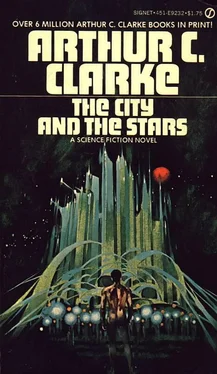Yet if the Memory Banks– were destroyed, within a thousand years the city would be dead, since its people had lost the power to reproduce themselves. That was the dilemma that had to be faced, but already Hilvar had glimpsed one possible solution. There was always an answer to any technical problem, and his people were masters of the biological sciences. What had been done could be undone, if Diaspar so wished.
First, however, the city would have to learn what it had lost. Its education would take many years-perhaps many a centuries. But it was beginning; very soon the impact of the first lesson would shake Diaspar as profundly as had contact with Lys itself.
It would shake Lys too. For all the difference between the two cultures, they had sprung from the same roots-and they had shared the same illusions. They would both be healthier when they looked once more, with a calm and steadfast gaze,, into the past which they had lost.
The amphitheater had been designed to hold the entire waking population of Diaspar, and scarcely one of its ten million places was empty. As he looked down the great curving sweep from his vantage point high up the slope, Alvin was irresistibly reminded of Shalmirane. The two craters were of the same shape, and almost the same size. If one packed the crater of Shalmirane with humanity, it would look very much like this.
There was, however, one fundamental difference between the two. The great bowl of Shalmirane existed; this amphitheater did not. Nor had it ever done so; it was merely a phantom, a pattern of electronic charges, slumbering in the memory of the Central Computer until the need came to call it forth. Alvin knew that in reality he was still in his room, him and that all the myriads of people who appeared to surround him were equally in their own homes. As long as he made no attempt to move from this spot, the illusion was perfect. He could believe that Diaspar had been abolished and that all. its citizens had been assembled here in this enormous cavity.
Not once in a thousand years did the life of the city stop. so that all its people could meet in Grand Assembly. In Lys» also. Alvin knew, the equivalent of this gathering was taking place. There it would be a meeting of minds, but perhaps associated with it would be an apparent meeting of bodies, as imaginary yet as seemingly real as this.
He could recognize most of the faces around him, out to the limits of unaided vision. More than a mile away, and a thousand feet below, was the little circular stage upon which the attention of the entire world was now fixed. It was hard to believe that he could see anything from such a distance, but Alvin knew that when the address began, he would hear and observe everything that happened as clearly as anyone else in Diaspar.
The stage filled with mist; the mist became Callitrax, leader of the group whose task it had been to reconstruct the past from the information which Vanamonde had brought to Earth. It had been a stupendous, almost an impossible undertaking, and not merely because of the spans of time involved. Only once, with the mental help of Hilvar, had Alvin been given a brief glimpse into the mind of the strange being they had discovered-or who had discovered them. To Alvin, the thoughts of Vanamonde were as meaningless as a thousand voices shouting together in some vast, echoing cave. Yet the men of Lys could disentangle them, could record them to be analyzed at leisure. Already, so it was rumored-though Hilvar would neither deny nor confirm this-what they had discovered was so strange that it bore scarcely any resemblance to the history which all the human race had accepted for a billion years.
Callitrax began to speak. To Alvin, as to everyone else in Diaspar, the clear, precise voice seemed to come from a point only a few inches away. Then, in a manner that was hard to define, just as the geometry of a dream defies logic yet rouses no surprise in the mind of the dreamer, Alvin was standing beside Callitrax while at the same time he retained his position high up on the slope of the amphitheater. The paradox did not puzzle him; be simply accepted it without question, like all the other masteries over time and space which science had given him.
Very briefly, Callitrax ran through the accepted history of the race. He spoke of the unknown peoples of the Dawn Civilizations, who had left behind them nothing but a handful of great names and the fading legends of the Empire. Even at the beginning, so the story went, Man had desired the stars-and had at last attained them. For millions of years he had expanded across the Galaxy, gathering system after system beneath his sway. Then, out of the darkness beyond the rim of the Universe, the Invaders had struck and wrenched from him all that he had won.
The retreat to the Solar System had been bitter and must have lasted many ages. Earth itself was barely saved by the fabulous battles that raged around Shalmirane. When all was over, Man was left with only his memories and the world on whih he had been born.
Since then, all else had been long-drawn anticlimax. As an ultimate irony, the race that had hoped to rule the Universe had abandoned most of its own tiny world, and had split into the two isolated cultures of Lys and Diaspar-oases of life in a desert that sundered them as effectively as the gulfs between the stars.
Callitrax paused; to Alvin, as to everyone in the great assembly, it seemed that the historian was looking directly at him with eyes that had witnessed things which even now they could not wholly credit.
«So much,» said Callitrax, «for the tales we have believed since our records began. I must tell you now that they are false-false in every detail-so false that even now we have not fully reconciled them with the truth.»
He waited for the full meaning of his words to strike home. Then, speaking slowly and carefully, he gave to both Lys and Diaspar the knowledge that had been won from the a mind of Vanamonde.
It was not even true that Man had reached the stars. The whole of his little empire was bounded by the orbits of Pluto and Persephone, for interstellar space proved a barrier beyond his power to cross. His entire civilization was huddled around the sun, and was still very young when-the stars reached him.
The impact must have been shattering. Despite his failures, Man had never doubted that one day he would conquer the depths of space. He believed too that if the Universe held his equals, it did not hold his superiors. Now he knew that both beliefs were wrong, and that out among the stars were minds far greater than his own. For many centuries, first in the ships of other races and later in machines built with borrowed knowledge, Man had explored the Galaxy. Everywhere he found cultures he could understand but could not match, and here and there he encountered minds which would soon have passed altogether beyond his comprehension.
The shock was tremendous, but it proved the making of the race. Sadder and infinitely wiser, Man had returned to the Solar System to brood upon the knowledge he had gained., He would accept the challenge, and slowly he evolved a plan which gave hope for the future.
Once the physical sciences had been Man’s greatest interest. Now he turned even more fiercely to genetics and the study of the mind. Whatever the cost, he would drive himself to the limits of his evolution.
The great experiment had consumed the entire energies of the race for millions of years. All that striving, all that sacrifice and toil, became only a handful of words in Callitrax’s narrative. It had brought Man his greatest victories.
He had banished disease; he could live forever if he wished, and in mastering telepathy he had bent the most subtle of all powers to his will.
He was ready to go out again, relying upon his own resources, into the great spaces of the Galaxy. He would meet as an equal the races of the worlds from which he had once turned aside. And he would play his full part in the story of the Universe.
Читать дальше












